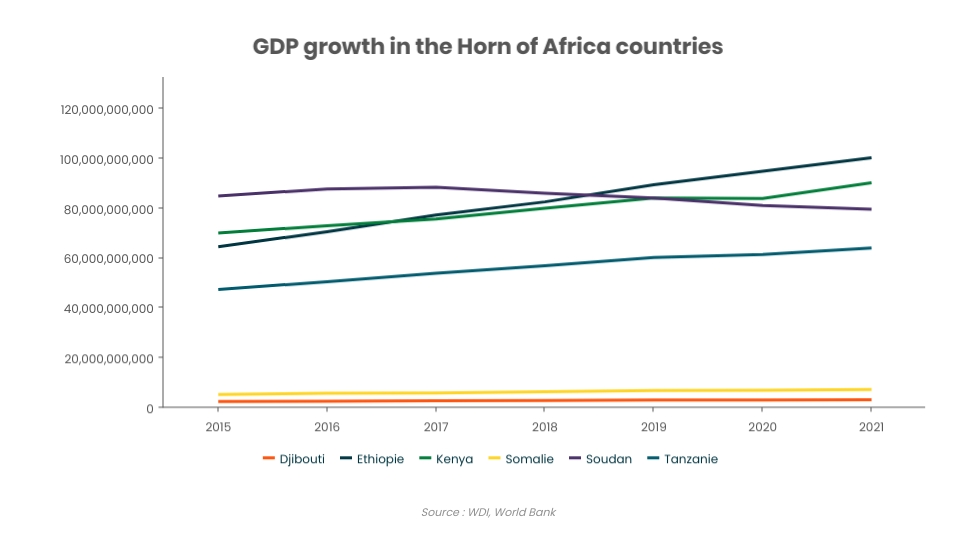Identification of the Horn of Africa
Horn of Africa
The Horn of Africa is a region in the east of the African continent, so named because of its horn-like shape on the map. It consists mainly of four countries – Somalia, Djibouti, Ethiopia, and Eritrea – but can also include other East African countries such as Sudan, South Sudan, Kenya, and Tanzania, depending on their economic and strategic importance.
Rich in natural resources and human potential, the Horn of Africa faces major economic and social challenges. Indeed, the region’s strategic location, particularly along maritime routes, places it at the center of many geopolitical issues.
Sub-Saharan countries in the Horn of Africa
The Horn of Africa encompasses several sub-Saharan countries, each with its own economic and financial characteristics, including Ethiopia, Somalia, Sudan, and South Sudan. Ethiopia, the region’s largest economy, is expected to grow by an estimated 4.2 % in 2024, according to the IMF. Its GDP will reach 126.78 billion USD in 2022, with an annual growth rate of 5.3 %.
As for Somalia, it has significant economic potential in the agriculture and aquaculture sectors, with an economic growth forecast of 3.7 % in 2024, according to the World Bank.
Sudan and South Sudan have significant untapped resources, accounting for 10 % of the world’s undeveloped arable land along both the Blue and White Nile rivers. The two countries also have significant gold reserves and are strategically located to access important markets in the Gulf States.
Finance in the Horn of Africa
Role of international assistance
Several projects are underway in the Horn of Africa to stimulate economic growth in the region. These include the Leveraging Strategic Private Sector Investment for Fragile States project, which focuses specifically on private sector investment. South Korea is a key partner in this project, having strengthened its economic and diplomatic ties with the African Development Bank over the years.
Interestingly, South Korea’s rapid development has had a significant impact on African countries. In fact, in the 1960s, South Korea’s level of development was comparable to that of many African countries. Today, South Korea is the world’s 12th economic powerhouse and a source of inspiration for African countries seeking similar performance.
Investment and Economic Development Opportunities
The role of the private sector in the development process is undeniable. With this in mind, heads of state from the Horn of Africa met as part of the initiative at the 2023 Annual Meetings organized by the African Development Bank. The leaders agreed to increase private investment in the region.
The meeting, chaired by Ethiopia’s Minister of Finance, H.E. Ahmed Shide, emphasized the need to prioritize financing gaps. The initiative was supported by Germany, the African Development Bank, the European Commission, and the World Bank.
AfDB Vice President Marie Laure Akin-Olugbade highlighted the progress made despite challenges such as political instability, natural disasters, and climate crises, not to mention the global geopolitical situation. The meeting also resulted in an agreement for a 72 million USD project in Somalia to develop infrastructure linking Djibouti and Somalia. Representatives from the Saudi Fund for Development and the Islamic Development Bank also attended the meeting.







